by Claire Davis | Mar 25, 2022
Being in the great outdoors is a great way to spend your time with family! What are some ideas for activities you can do outdoors with your friends and family? Some of the best outdoor activities could include going for a hike, swimming, hunting, kayaking, or even building a campfire. With the weather still cool and a little dry here in Northwest Florida, sitting around a campfire sounds like the right kind of fun! However, it is extremely important to be sure that your campfire does not put anyone at risk of wildfires or burns.
Check out some of the fire safety tips below!
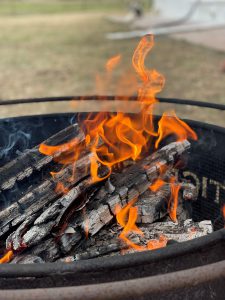
- Use a designated fire pit, if available. If this is not an option, clear a space on the ground, removing any grass or needles that could potentially catch fire.
- Build your fire downwind and away from tents, houses, or anything that is flammable. What does flammable mean? Anything that can easily set fire is flammable. The USDA suggests a minimum of at least 3 feet away from anything that can catch fire.
- Have water or something to douse the fire nearby. In the event of fire escaping its designated area, you will need to be able to put it out swiftly to prevent a wildfire. Consider a water hose that is hooked up to a water source or a fire extinguisher. Also, before leaving your fire site, make sure the fire is extinguished!
- You know the drill! Stop, Drop, and Roll! Make sure that everyone present knows how to put out a clothing fire with these three simple steps.
- Never leave children unattended around a fire. As the adult, it is your responsibility to make sure that everyone is safe! Also, store matches, lighters, and lighter fluids out of children’s sight and reach.
- Think about what you are wearing. Do not wear open toed shoes, as a spark could come off a flame and burn your toe. Instead, wear closed toed shoes while around the fire. Do not wear loose fitting clothing. If you lean over a fire with a baggy t-shirt on, chances are your shirt could catch on fire. Wearing snug-fitting clothing is an easy way to prevent this from happening.
Another “hot” topic is grilling! As we all know, fire and charcoals are extremely hot. Make safe cooking a priority, especially when it comes to outdoor grilling. With summer coming, grilling will become a more popular activity!
A great way for you youth to learn about safe grilling practices is for them to attend a 4-H Tailgate Grilling Camp! This summer,
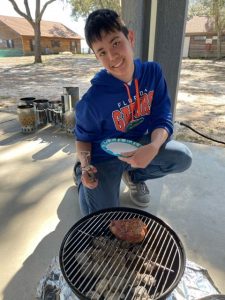
Youth learning to grill pork safely!
Calhoun and Liberty County 4-H Agents, Claire Reach and Marie Arick will be teaming up to offer this program to area youth. Youth will not only learn about the importance of fire safety, but also how to mix rubs or marinades for their meats, and how to grill different animal proteins!
If this is something you think your child or a youth you know might be interested in, stay tuned for upcoming date announcements for summer camps. If you have questions, comments, or concerns, please give us a call at the UF/IFAS Extension Calhoun County Office: (850)-674-8323.
An Equal Opportunity Institution.
Sources:
https://www.firesafekid.org/family-fire-safety/outdoor-fire-safety/
https://www.usfa.fema.gov/downloads/fief/outdoor_fire_safety.pdf
by Marcus Boston Jr. | Feb 4, 2022
My name is Marcus Boston and I’m the County Extension Director and 4-H Youth Development Agent in Leon County, Tallahassee FL. I’m originally from Gainesville Florida and have worked for the Leon County Extension Service as a 4-H Extension Agent, for 29 years.
I was born and raised in Gainesville FL., the location of the State 4-H office but was never involved in 4-H as a youth. I graduated from Buchholz High School in Gainesville Florida and earned a football scholarship to attend school and play football for Florida A&M University (FAMU) in Tallahassee. As a result of my accomplishments on and off the team, during my senior year, I was awarded the prestigious Alonzo Smith “Jake Gaither” Award. I completed my B.S. degree in Agribusiness and while working as a graduate assistant coach on the football team, I completed my M.S. in Agricultural Sciences. Prior to starting graduate school, I worked as a Sideline Commentator for the Florida A&M football games that were aired on a local radio station. After completing graduate school, I began my professional career as an extension agent with Florida A&M University and the University of Florida working primarily with 4-H Youth Development.
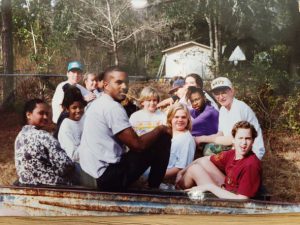
Marcus joins Leon County 4-H Leadership Club fun day activity in the early 90’s
When I started in Leon County one of my first assignments was to make a personal visit to all the existing 4-H clubs in the county at that time. After meeting all the wonderful volunteers and youth involved in our Leon County 4-H program, I was inspired by all the fun educational projects the youth were involved in and encouraged by the commitment and passion of the volunteers that oversaw the clubs. It is this commitment and passion that still exist today and that encouraged me to work extra hard to recruit and train volunteers so there could be more clubs for youth to join.
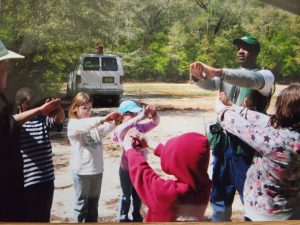
Marcus Boston teaching youth how to determine which eye is dominant before archery class
The establishment of my Environmental Education/Stewardship Program is one of my most successful programs here in Leon County. This program includes a series of smaller programs developed and carried out with the primary objective of educating our youth about the importance of conserving, protecting, and appreciating our environment and how they can become environmental stewards in their respective community’s. These experiences are tailored to equip youth participants with the information they need that will help them make logical decisions on environmental issues that may arise as they enter adulthood. In a few years these youth could be accountable for attitudes, perceptions and policies that affect our environment as well as our soil. A few of the environmental focused experiences that I developed and carried out during past several years as part of our Leon County 4-H program are: 4-H Ecology Field Day, 4-H Eco-ventures Spring Break Camp, Wild About Water Day Camp, The Talking Trash Day Camp, Going Green Day Camp, No Woods Left Behind Day Camp, Trees and Bows Day Camp, 4-H Wildlife and Outdoor Recreation Camp at Jubilee, and residential camp at 4-H Camp Cherry Lake held in Madison FL.
As a certified archery and canoe instructor, I’ve had the pleasure of teaching thousands of youth communications and safety skills using a canoe and a bow and arrow as the vehicle of choice. Both of which I’m still involved to this day. In an effort help young people learn the life cycle, I have taught the 4-H Embryology program in several schools in Leon County. This program has provided the opportunity for hundreds of students and teachers, to watch chicks hatch out of their eggs right before their eyes in their classroom…an experience they never forget.
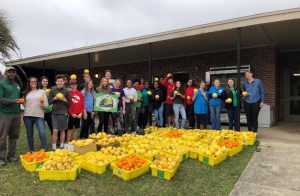
Leon County 4-H Camp Counselors kickoff counselor training with gleaning 1,300 lbs. of fruit to provide for homeless shelter
The Leon County 4-H Camp Counselor Training Program has also served as one of my most successful teen leadership programs. I have enjoyed recruiting, training and equipping hundreds of teens with the skills and knowledge they need to: Manage campers at our residential camp, understand the “ages and stages” of the youth they supervised, apply strategies for teaching classes at camp, and most important, keeping camp safe for all in attendance. Due to the success of this program, former counselors from our counselor training program are viewed and recruited as potential camp staff for our State 4-H camps each year.
I have also enjoyed providing opportunities for thousands of youth in Leon County Schools to participate in The 4-H Tropicana Public Speaking Program (now known as the Florida 4-H Public Speaking Program sponsored by Florida Power and Light) which annually provides an opportunity for over 7,000 Leon County 4th, 5th, and 6th graders to develop, write, and present a speech on a topic of their interest. With so much emphasis on texting and posting…this program continues to provide a platform for young people to develop their oral communication skills which is crucial as they graduate and enter the work force.
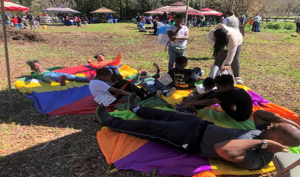
Marcus Boston is demonstrating fitness techniques with attendees during Youth Extension Day in Leon County.
I have also been a Project Learning Tree(PLT) facilitator for over 20 years and have help to train over 500 college students from Florida State, Flagler College and Florida A&M University in how to teach youth environmental education using the PLT curriculum.
The last six years as County Extension Director has provided me an opportunity to promote UF/IFAS Extension by managing and working with my faculty in providing researched based information in the form of workshops, field days, 4-H clubs, seminars, virtual and hybrid webinars and school enrichment programs in an effort to help youth and adults in the Leon County Community find the Solutions For Their Life. I have always believed that active participation in 4-H provides youth the tools in life to be successful in whatever direction they choose to go.
by Rachel Pienta | Jan 21, 2022
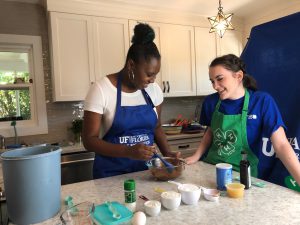 Healthy Living is one of the 4-H’s. While your club may not specifically focus on what is traditionally considered to be “healthy living” activities, you might be surprised about much your 4-H club is contributing to the mental and physical well-being of youth members. After we recognize that all our clubs have a role to play in implementing healthy living strategies across the county 4-H program, we can start to consider ways to be intentional in how we incorporate healthy living into 4-H activities and projects.
Healthy Living is one of the 4-H’s. While your club may not specifically focus on what is traditionally considered to be “healthy living” activities, you might be surprised about much your 4-H club is contributing to the mental and physical well-being of youth members. After we recognize that all our clubs have a role to play in implementing healthy living strategies across the county 4-H program, we can start to consider ways to be intentional in how we incorporate healthy living into 4-H activities and projects.
What does a 4-H Healthy Living program include? A 4 H Healthy Living program or strategy is any activity or program component that can help youth lead lives that balance physical, mental, and emotional health.
According to the National 4-H Council, 4-H Healthy Living programs include objectives that can help “empower youth to be healthy – body and mind – with the skills to make healthy decisions and lead healthy lifestyles. Having the confidence and skills to lead healthy lifestyles not only improves overall well-being; it enables youth to tackle life’s challenges today and become leaders in their lives, careers, and communities as they grow into responsible adulthood” (National 4-H Council, 2021). Your club focus might fit into one of the following program areas: mind, body, leadership, or mentorship.
As a club leader, you may encourage your youth to adopt goals and projects that will cover multiple program areas. Introducing healthy living during club meetings is another way to incorporate these concepts and help youth develop healthier habits.
With so many possible topics to consider, it may seem overwhelming to choose a starting point. In this article, a few suggestions will be explored.
Sleep
It may be surprising to learn that youth, like adults, are not getting enough sleep. Regularly missing hours of sleep or experiencing poor sleep quality can contribute to a variety of issues for youth. The Sleep Foundation is one resource to use for tips on how to encourage our 4-H members to adopt better sleep habits (Pacheco, 2021).
Some ideas for helping your 4-H youth learn about the importance of sleep and how to develop better sleep habits include the activities and lessons listed in the links below this paragraph. Consider challenging your youth to set healthy sleep goals for one month. Discuss the potential benefits during your goal setting activity. At the end of the month, discuss how youth felt on days when the sleep goals were met and how they felt on days when they did not meet their goal.
Activity for Teens (Intermediates and Seniors)
University of Wisconsin Extension. 2007. “4-H Get Fit, That’s It. Lesson 2: Are You Getting Enough Sleep.” Link to activity: https://api.ag.purdue.edu/api/DepotWS/File.ashx?t=f&i=98730
Activity for Elementary School Age (Juniors 4-H Members)
The Nemours Foundation. 2015. Sleep. Kids’ Health in the Classroom.
https://classroom.kidshealth.org/classroom/3to5/body/functions/sleep.pdf
Hydration
One way to incorporate a healthy living strategy into your 4-H program is offering water at all your meetings and limiting the inclusion of other beverages. A 4-H lesson on hydration can include STEM principles as youth can calculate their daily water needs based on their body weight. A fun way to encourage water consumption is to personalize reusable water bottles as a club activity and to award points to youth who remember to bring their bottles to meetings and activities.
All Ages Lesson and Activity
National 4-H Council.2020. How Much Water Do You Need? 4-H Healthy Living Activity Guide.
https://4-h.org/wp-content/uploads/2019/04/4H-Healthy-Living-Activity-Guide.pdf
Other Ways to Incorporate Healthy Living into Your Club Programs
Activities designed to improve sleep and hydration are only two of many possible ways to incorporate healthy living into your 4-H program. Healthy Living activities can incorporate exercise, nutrition, and ways to improve and maintain mental health.
Resources
Caruso, L.; Shelnut, K.; Kauwell, G. 2017. Hydration Myths. UF/IFAS Extension. Retrieved January 16, 2022 from https://edis.ifas.ufl.edu/publication/FY1409.
National 4-H Council. 2021. Healthy Living. Retrieved January 16, 2022 from https://4-h.org/parents/healthy-living/.
Pacheco, D. 2021. Children and Sleep. The National Sleep Foundation. Retrieved January 16, 2022 from https://www.sleepfoundation.org/children-and-sleep.
University of California 4-H Youth Development Program. 2022. Sleep for Better Living. Retrieved January 16, 2022 from https://4h.ucanr.edu/Projects/HealthyLiving/Sleep_for_Better_Living/
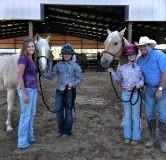
by Julie McMillian | Sep 25, 2020

A 4-H family gathered together at a show.
Are you looking for another way that you can aid your child in becoming a healthy well-adjusted adult? You help can them by allowing them to enter a relationship with a horse. Most kids are naturally drawn to horses and may benefit greatly in what they can gain from them. Some life skills learned from caring for equine are character building, healthy living, leadership skills, and responsibility, just to name a few. Plus, if your child is out at the barn caring for their horse, they are less likely to be stuck on their phones on the couch. Therefore, their physical health will benefit from doing chores and riding as well. Horseback riding offers many aerobic-exercise benefits such as building muscles, boosting balance, and increasing coordination and flexibility. Lifting saddles, water buckets, and cleaning require physical movement as well as gives a sense of self accomplishment of “I can do this all by myself.” When youth are responsible for the care of a horse, it teaches them to put others needs above their own and they learn empathy.
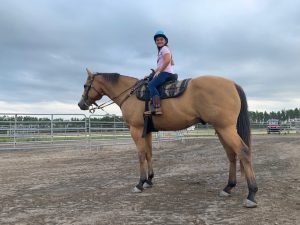
Emily, 4-H member, sitting on her horse, Slyder.
Did you know 4-H has a horse program? The goal of the program is to teach and provide young people with an opportunity to participate in activities that foster the love for the animal and achieve their goals. The activities are designed to improve citizenship, sportsmanship, horsemanship, character, competitive spirit, and discipline while making youth aware of life around them. When thinking about the 4-H horse program, there is the potential for participation in horse judging, public speaking, demonstrations, hippology and quiz bowl. Participation in these activities can help a youth improve in many areas to gain a better education and they don’t have to necessarily have a horse. There is also horse showing for those who own a horse. Showing equine will connect youth from all over the world as horse family while teaching them to prepare, build the courage to compete, enjoy the rewards and deal with disappointments. Hopefully, the disappointments will drive them to succeed and work harder while furthering their leadership skills. Afterall, taking control of a thousand-pound animal to work through challenging tasks will require skills that promote a child’s self-competence.
If you are looking for something new to spark an interest in your child, consider the 4-H equine project. Horses are fun, help teach great life skills, and kids adore them. They will keep youth positively engaged during their difficult years from pre-teen and into adulthood. If you are unsure of what your county has to offer in the way of equine 4-H programs, give your local UF IFAS County Extension Office a call and they will help you or connect you with someone in the field or visit http://florida4h.org.
*“Please note pictures were taken prior to our challenges with Covid-19 and we remind people to social distance and wear a mask for the personal safety of self and others.”
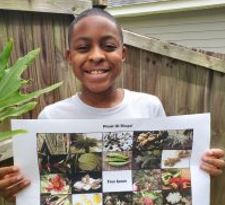
by Marcus Boston Jr. | Jul 31, 2020
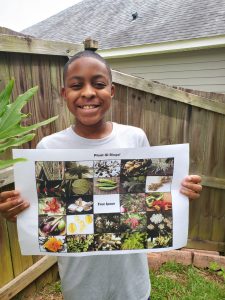
4-H Virtual Plant Science Camp Bingo Game
July 6th of this year was supposed to be the first day of our 4-H Wildlife and Outdoor Recreation Day Camp with Leon and Jefferson Counties participating. Due to the pandemic, all of our Florida 4-H face to face camps were cancelled this summer due to safety concerns for the students and the instructors.
In spite of everything that has taken place since March of this year, there is still some good news! Even though we are in the middle of a pandemic, there is an outdoor classroom in YOUR backyard that has plenty of room for young people and parents to explore. While most youth have spent more time than they probably want to with their families confined, within the four walls of their home, there is no time like the present to explore wildlife and gardening opportunities that await just outside the door. Youth that spend time outside exploring the great outdoors have the unique opportunity to stimulate their senses while engaging in “hands on” educational activities without even knowing it.
4-H provides countless opportunities for youth to gain a better understanding of how all organisms are interrelated and how they can become environmental stewards at home, school, and in the communities in which they live. What are some of the benefits of converting backyards to outdoor classrooms?
I’m glad you asked…here are just a few!
1. Healthy lifestyles are encouraged –
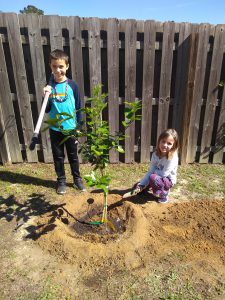
Youth planting an orange tree after participating in Virtual Plant Science Camp
Active time spent outside may help address some of the health issues we are seeing in children today such as obesity, attention deficit disorders, and depression.
2. Nature deficit disorder decline –
Exposing students to nature and allowing them to learn and play outside has shown to foster sensitivity, appreciation, and respect for the environment. It combats “nature deficit disorder” …and it can be a lot of FUN!
3. Critical-thinking skills enhanced –
Exploring what is in the backyard and starting a garden provides opportunities for experiential learning outside of the classroom and enables students to make connections that can be applied to the real world.
4. Responsible action is taken to better the environment –
By exploring outdoors either by planting or just observing nature, youth begin to understand how their decisions and actions affect the environment. It is from this point they can begin to obtain the skills necessary to address complex environmental issues as well as ways we can take action to keep our environment healthy and sustainable for the future.
So even though we are in the midst of a pandemic, there may be opportunities to make lemonade out of the COVID-19 lemons we find ourselves in by unmasking the opportunities that await in our backyards!
For more information about 4-H in your county, find your local UF/IFAS Extension office or visit http://florida4h.org.
*“Please note some pictures were taken prior to our challenges with Covid-19 and we remind people to social distance and wear a mask for the personal safety of self and others.”
by aschortinghouse | Jul 27, 2018
GAGA BALL
If your youth has attended 4-H Camp Timpoochee or Cherry Lake with the UF/IFAS 4-H Camping Program, they’ve had the chance to play GaGa Ball. You’re probably wondering what kind of name is GaGa ball. It’s not just a made-up name. GaGa ball has a rich history. GaGa is translated from Hebrew as “touch-touch”. It’s said to have originated in Israel, and it has become a popular game at camps around the United States. GaGa Ball is a version of dodgeball and is just as fun.
LET’S PLAY!
GaGa ball is not only fun to say, but it is really easy to learn. First, you need a place to play. GaGa ball is played in a GaGa pit. Here’s just one of many articles on how to build your own GaGa Ball Pit. Next, you need a ball. GaGa balls are not specific, although a heavy duty dodgeball is recommended. The rules of the game vary place to place, but we play by the following rules at 4-H Camp:
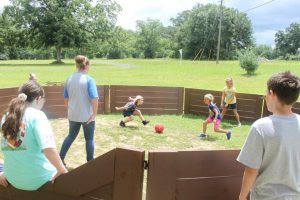
- You hit the ball with your hands only.
- If the ball hits you below the knee, you are out.
- If the ball bounces of the wall and hits you below the knee, you’re out.
- If you hit the ball out of the pit, you’re out.
- If you hit someone in the face, you’re out
- If the game is going slowly, the leader can call “Hands-In”.
Hands in means everyone who is already out can put their hands over the wall of the pit and try to get those still in the pit out.
Rules can be made and altered to fit the group that is playing the game although the first two rules are staples of the game.
WHAT’S THE BIG DEAL?
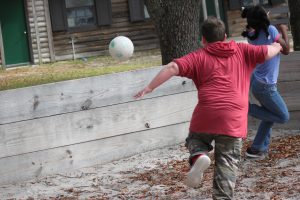
GaGa ball is a great way to expend extra energy during day camps, but it also is a great way to build and practice life skills. First off, youth are put in situations in every game where they have to practice decision making, discipline, resiliency and many other life skills 4-H strives to instill in our youth. Of course they have to practice their conflict resolution skills as there will inevitably conflicts that arise from their competitive natures. Most importantly, playing GaGa ball helps kids practice a healthy lifestyle. GaGa ball teaches many important lessons, and is a bunch of fun. So when you hear someone say, “Let’s play GaGa ball!”, give it a try and embrace the challenge.
Learn more about the history of GaGa Ball














